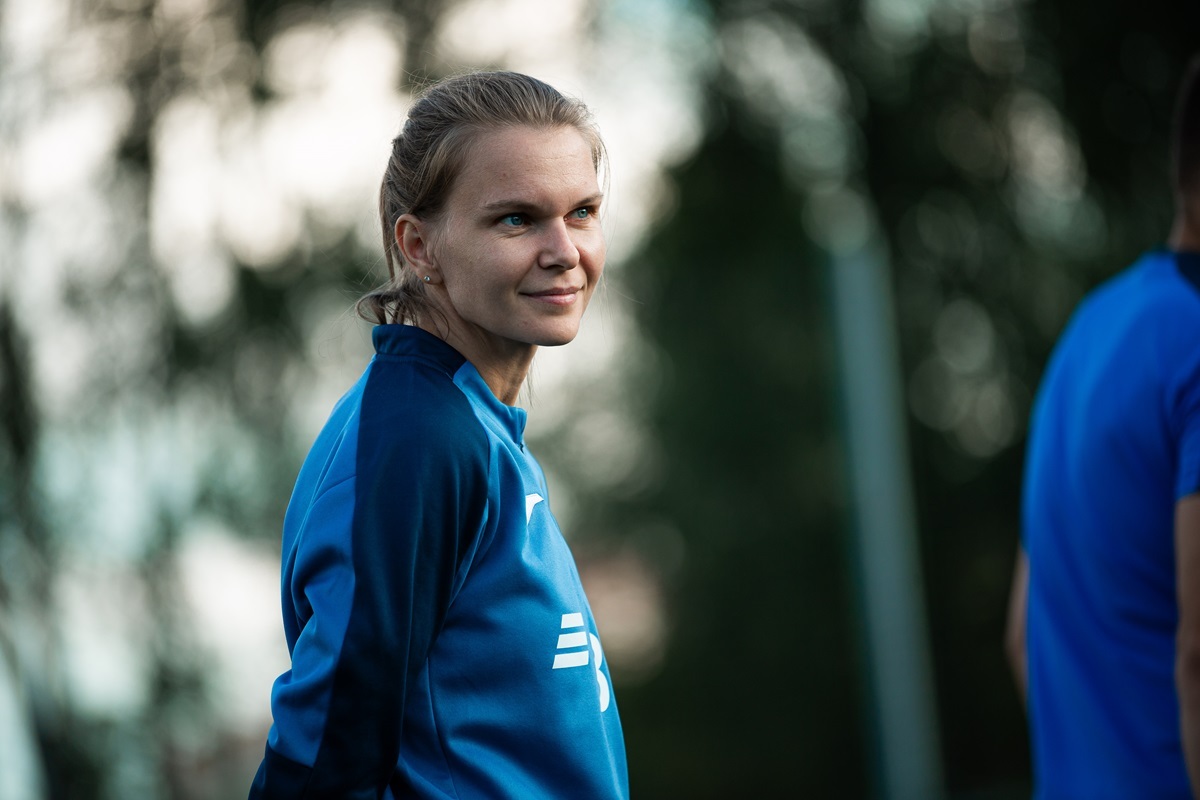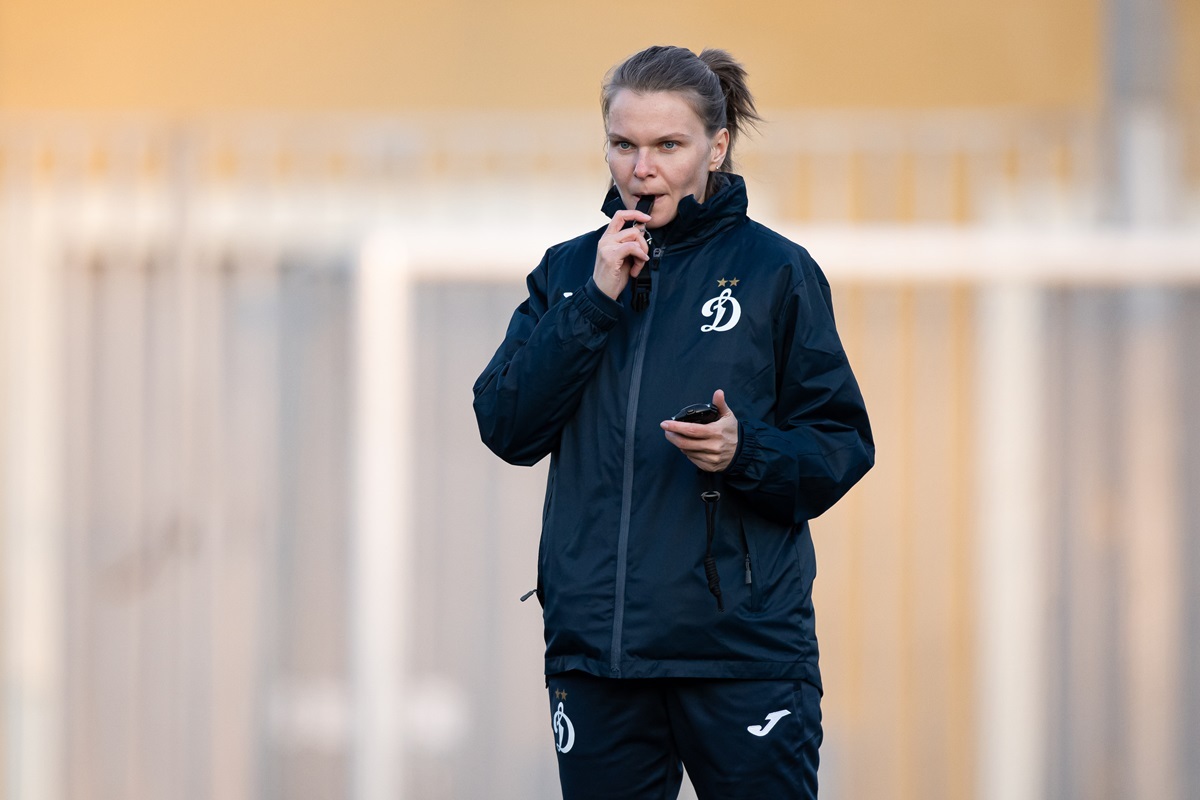
In a long interview, the assistant head coach of the youth team of the WFC Dynamo spoke about her professional sports career, the specifics of working with girls of different ages, and also spoke about the development of women's football in Russia and the world.
Date of birth: 09/03/1988 (36 years old).
Place of birth: Moscow.
Pupil of the football school "Chertanovo" (coach - Tatyana Nikitichna Bikeikina). As a player, she played for the capital's "Chertanovo" (football), St. Petersburg "Neva", "SPK-Perm" (all - mini-football), "Strogino" (beach soccer) and the Russian national beach soccer team, with which she won the Euroleague Cup in 2021.
In 2013, she graduated from the Moscow Institute of Physical Education and Sports, and has a category B coaching license. She worked at the Chertanovo sports boarding school (2010-2019) with a team of girls born in 2004, who became multiple champions of the Moscow summer and winter championships, and also won the Russian championship among sports schools in their age group.
She has been working in the structure of the Dynamo Women's Football Club since the very first day of the Women's Academy's formation in 2022. At first, she held the position of head coach of the U-13 (U-14) team, then, since 2023, head coach of the white-blue U-15 (U-16) team.
In January 2024, she was appointed assistant to the head coach of the Dynamo Women's Football Club U-21 youth team.
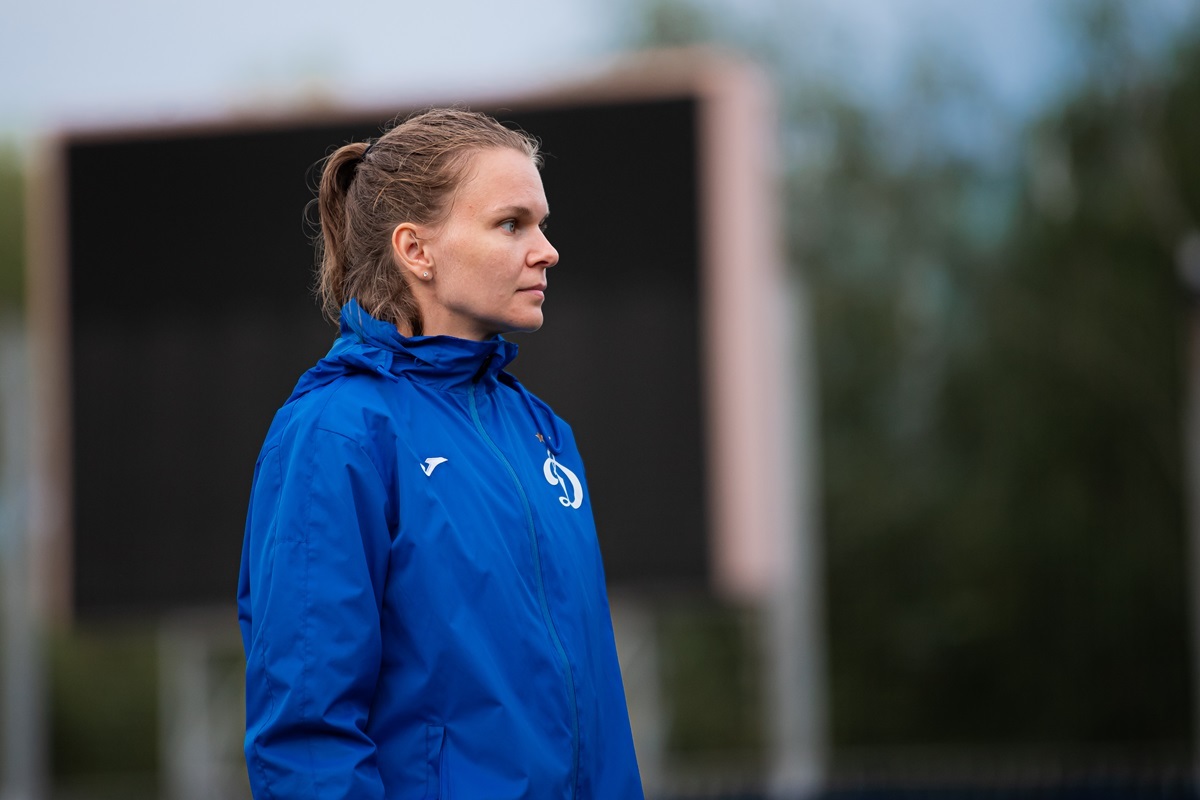
“With 15 and 16 year old football players you already speak the same language, they understand everything”
— How did Dynamo appear in your life?
— It happened in 2021. They called me from Dynamo, told me that a project of a women's Academy was opening and offered to work. I doubted for a long time, but they finally convinced me by involving a friend who at that time was already working in the structure of the Dynamo men's Academy. In the end, I persuaded and decided to take a risk.
At that time, there was no talk of a Super League team. Dynamo entered the Youth League, as well as two children's ages in the YFL - U-13 and U-15. I became the coach of the U-13 team, and Valentina Vladimirovna Barkova - the U-15 team.
— After the U-13 team, you moved on to work with the U-15 girls. Who was easier to work with, who was harder?
— At that time, the U-15 team was renamed U-16. It's probably always easier to work with older kids, and in general I try to work with older kids. It's easier with them, because you already speak the same language with 15- and 16-year-olds, they understand everything. But when a child is 13-14 years old, some tactical moments have to be simplified and explained in a language they understand.
— And in terms of technical and game moments?
— If we talk about technical moments, many of our girls, so to speak, have gaps in school, so I devoted a lot of time to technical aspects, both with the U-13 team and with the U-15. This is the base. These problems had to be eliminated against the background of some tactical schemes. Of course, it was difficult, but interesting at the same time.
— Each age has its own characteristics. Based on your experience, what age is the most comfortable to work with?
— It seems to me, the older, the better. I feel more comfortable with older ones. On the other hand, I have no prejudices about little kids. However, I repeat, it is more interesting with older ones.
— Now you are working with the Dynamo youth team. What are the peculiarities of this age of girls?
— The peculiarities are rather in the coaching work, because our task is to prepare girls for big sports, for the Super League, and it does not matter whether it will be a top-level team or a middling one. This is a kind of transition period, and I have not worked with this age yet.
I am very interested in when girls, when moving from children's football, need to be conveyed how to act in adult football. There are different speeds, and speed of decision-making, and tricks, and the level of struggle, and preparation, when you need to smoothly lead to adult football and give something to the girls. This is a really interesting process.
— You have a good tandem with Mikhail Yuryevich Kobyakov. Tell us how responsibilities are distributed in your staff, who is responsible for what?
— Mikhail Yuryevich is the head coach, I help him with everything. Together we discuss the immediate planning that the team needs. Basically, this is comprehensive assistance to the head coach, be it a warm-up, a main exercise or an exercise with a group that does not participate in the training.
We also constantly discuss game and training moments, analyze what worked and what did not, what we want to see. I like that we have a single view of football, plus we more or less agree on the opinions of the female players, their prospects. In a word, it is very comfortable and easy to work with Mikhail Yuryevich.
— Do you like the format of the Youth League, which this year again changed the structure of the championship?
— To be honest, I don’t really understand this format. We played the preliminary stage, and the points are transferred to the second stage only in matches with those teams that went further. This is somehow strange, because we also played, earned these points with blood and sweat, and in the end we come with zero.
On the other hand, some team that was a little luckier in the bracket enters with six points. It seems to me that this is somehow not very fair. Either zero out everyone, or go with the points earned. Therefore, in my opinion, a smooth "regular season" in two circles is a more logical format.
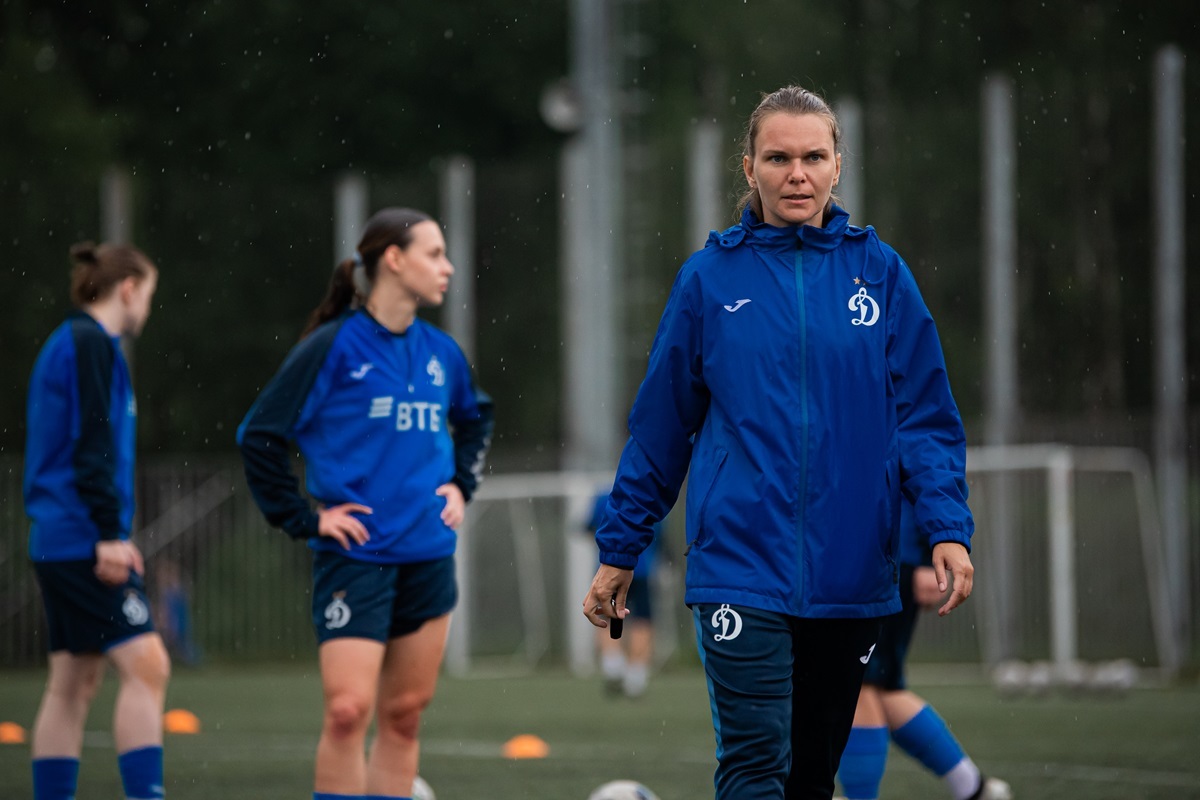
“I remember my first match, when I was just running along the sideline and didn’t understand what was going on”
— Wikipedia says that as a player, you played in all positions. Is that true? And did you have a favorite role?
— Of course, that's not true at all. My position was in the center of the field. As a child, I played as a striker, then I moved to the center, this is my native playing area.
— How did you get into football? And why football, because you probably played other sports as a child?
— I didn't do anything, only football. As far as I can remember, I always played football in the yard. By a lucky chance, a neighbor's guest saw me and told my parents about women's teams in Chertanovo, which is on the other side of Moscow.
My parents thought for a long time, deciding whether to take me or not. In the end, they got together, took me to Chertanovo, where I stayed for many years.
— Did they take you right away?
— There was no full-fledged boarding school back then. I was liked by the coach Tatyana Nikitichna Bikeykina right away, and she often tells me the story of how I came to the first training session and charmed her. However, after the training session, I decided that I didn’t want to go there anymore, I didn’t like something. I still can’t explain to myself what exactly. Tatyana Nikitichna was persistent and every day for two months she called my parents, persuaded them, we held a family council, everyone tried to persuade me – both grandparents. In the end, they persuaded me, and the second time I liked everything.
It all happened thanks to Tatyana Nikitichna. I don’t know where she got so much persistence from, because back then there were no mobile phones, only landlines. To this day, I am grateful to Tatyana Bikeykina for everything I know and can do in football. She raised me both as a player and as a coach, I learned a lot from her.
— You are a product of Chertanovo, but you only played a few matches for this team in 2005. Why did you leave the club?
— There weren’t many women’s teams in Moscow at that time. When I was about 15, they started to connect me to the Major League, they gave me some playing time, but I was mostly fighting for my life there. There was no such thing as smoothly preparing football players. I remember my first match, when the very experienced Galina Komarova started with my foot, and I, at 15 years old and weighing 36 kilograms, was trying to understand what was going on. I was just running along the sideline and didn’t understand what was going on.
As a result, I spent a season in the Major League with Chertanovo, I was called up to the main team, then they started connecting me to the Chertanovo mini-football team, which played in the Major League in mini-football. Things were easier there, but some problems started in the “mini” as well. There was only a youth team left, where all the talented and promising players were gathered. Then there was a change in management, which decided that at 19-20 years old we were not so promising and only schoolgirls should be left.
They said goodbye to us, but there was nowhere to go. The Izmailovo team opened only in 2007, so we had to finish.
— After Chertanovo, you went to St. Petersburg's Neva?
— Yes, I went to Neva for one season, played big football, and also mini-football in the Major League.
— Then you played at an amateur level. Was there no opportunity to return to the top division?
— I already went to work, played football somewhere, but it was more of a part-time job. As for returning to the "top league" - these thoughts somehow quickly passed. When the women's Lokomotiv was just created, I had already been working as a coach for five years, although I was offered to go and try myself as a player, the age was right.
However, I myself understood that I was no longer ready to be a professional player, life settled down and everything began to develop in coaching.
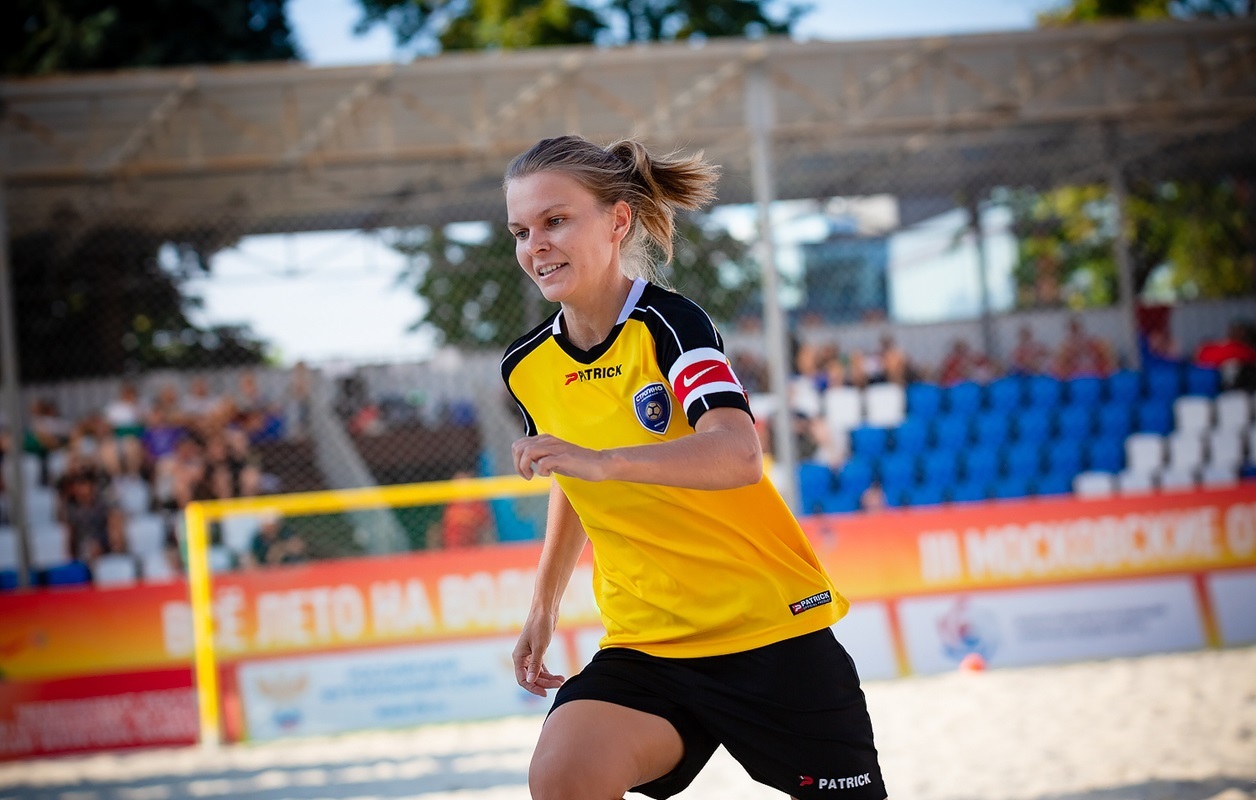
BSRussia.com
“I don’t like mini-football, everything there is schematic and very strange”
— Did you like mini-football more?
— No, I don’t like mini-football at all. Everything there is schematic and very strange. If something doesn’t go according to plan for people who have been playing mini-football since childhood, then the template breaks and panic sets in. It’s a very schematic sport, in which coaches really don’t like it when players improvise. It always turned me off.
— What are your most vivid memories from mini-football?
— When I was 14-15 years old, I was attracted to the Major Mini-Football League. Such greats as Olesya Didenko, Lyudmila Strebykina played there, these are players born in 1981, multiple champions of Russia. Compared to them, I was a baby.
And then in one of the matches, Olesya Didenko tells me: “Okay, you’re going now, don’t be afraid of anything. You pump there, come back, run to the far post and score. I pumped, ran, a second later the ball flew to me, I found myself in front of an empty goal and scored. At first I thought: some kind of mysticism. I still remember that goal. That's the kind of chemistry they had there.
It's a pity that there are no videos of those times. It would have been interesting to watch at least one game. But it was great to play with such professionals.
— Beach soccer is also on your resume? How did you end up there?
— Beach soccer is just a break between my coaching career, when I worked in other areas and had more time. After all, when you are a coach, it is very difficult to play at a high level, but in the evenings I had the opportunity to go to training. I trained hard, and in the end I had three solid years in beach soccer.
— So it was both a hobby and a way to stay in shape?
— More of a hobby. I didn't even think that there were any national teams or international tournaments. As a result, I visited various international competitions, I was invited to play for the beach "Zvezda", with whom I went to the Champions League.
— What football is beach soccer closer to?
— It's a completely separate sport. It is impossible to train on a large field, and then come and become successful on the sand. For example, I was taught all my life that the first touch of the ball should be to lower it down, but in the "beach" I could not do anything. When I realized that the first touch of the ball, on the contrary, should be to kick it, then everything came together.
In beach soccer, the technique is different, and the muscles work completely differently, I did not even think about their existence. Something can hurt in other places. Therefore, it is impossible to compare at all.
— You played at the club level too, didn't you?
— Yes, for "Strogino", in Moscow there was only this club. There was even a Russian championship, though only once a year – several teams would gather for seven days, play five or six matches, and that was it. So-so.
— And in terms of entertainment?
— Men's "beach" is, in principle, very entertaining. And women's has only just begun to actively develop, especially with the opening of St. Petersburg's "Kristall" - this is a team that gives professional contracts, they train daily, they are preparing. They play spectacularly.
Even if you compare the recordings from 2021, when we played the Euroleague, it was completely unwatchable. And now it's a different level - the ball is up and it looks like men's football.
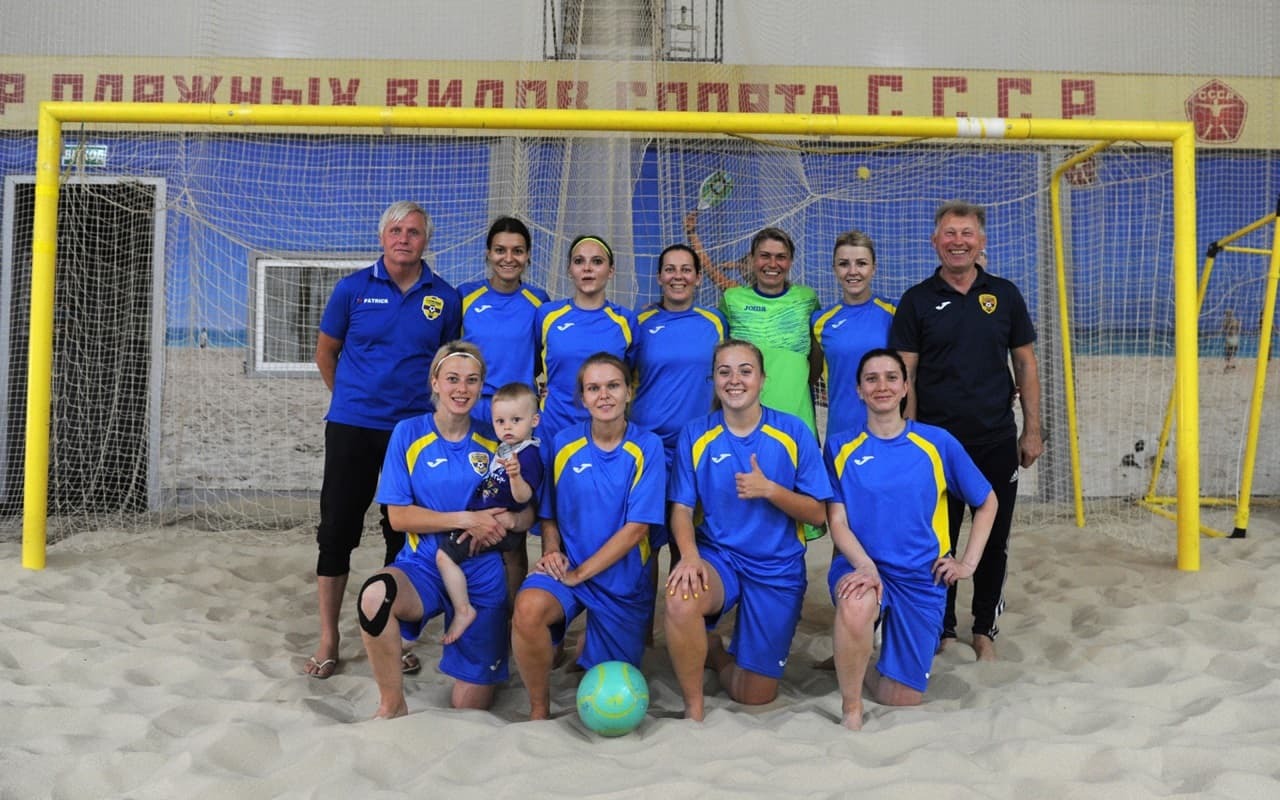
wmfl.ru
"I believe that a professional should not be defined by gender"
— Let's talk about coaching now. By the way, did you decide to become a coach right after you finished playing?
— It was a coincidence. I finished playing, and Tatyana Nikitichna Bikeikina, whom I respect, called me and said: "Lyuba, come on over and help me with the little ones." I went and helped.
Tatyana Nikitichna arranged for me to be taken to the Smena football club, where I worked for about three months, and from there I received an invitation from the management of Chertanovo to become a coach. They gave me the year of birth of 2004, and I kept this age until I graduated.
— Each coach has his own philosophy. How would you describe your coaching philosophy? What kind of football do you adhere to?
— I adhere to smart and intellectual football. Football is very athletic now, but in my opinion, all this is secondary.
I like smart combination football, playing low. I can't stand long passes and lobbed passes, I don't understand why they are used so often in women's football. In general, I would like my team to play like the women's Barcelona. What they do is very beautiful.
— Do you follow how women's football is developing in Europe and America? Which coaching school do you like?
— I mainly follow Barcelona. Mainly, these are Barça matches in the Women's Champions League. I like their tiki-taka, short and medium passes, technique. Previously, German and French teams dominated in Europe, sometimes the English "shot", but these are still power football teams.
Therefore, it is very gratifying that it is the technical and intellectual football that Barcelona shows that has taken its place at the top and was able to wedge itself into the power paradigm.
— In your opinion, should there be male or female coaches in women's football? Is there a fundamental difference?
— I often encounter sexism in this regard. Many managers believe that a woman should not lead an adult women's football team, that football is a man's business.
However, I believe that a professional should not be defined by gender. There are women who are great coaches, there are plenty of examples in the Super League. But I cannot single out any particular male coach for myself. It seems to me that a professional is not about gender.
— Women's football is developing in Russia, but there are not many truly high-class players at the level of Barcelona or Chelsea football players. What do you think this is connected with?
— It is a question of popularization. I have worked a lot in children's football and I know how much effort it takes to convince a girl's parents to send her to football. In Russia, unfortunately, this is not a selection process. We cannot choose: whoever comes to us, we mold from them. And even the one who eventually reaches the Super League is not a fact that she was a super-talented girl. This is the painstaking work of children's coaches.
Super League coaches are waiting for fresh blood and complain that academies are not working well. However, you have to be in that shoes when 12 girls come to you, and only five or six of them have coordination skills.
There are also stereotypes among parents. I used to be involved in recruitment, I went to schools, got phone numbers from physical education teachers and just called the parents of the girls I liked. Probably, during every second call I heard the phrase: "Actually, I have a girl, what football?" and they hung up. I think this cannot be eradicated.
Slowly, but the situation is changing. I think more than one generation must pass for parents to understand that football will not make a child's life worse. What difference does it make - dancing or football? The issue is precisely in the stereotypes: girls do not want to go, because this is inspired by parental opinion.
— How then to raise stars of women's football?
— From the point of view of my coaching experience, I can say that not all children who go through football school reach youth and then adult football. If before there was no youth women's football at all, now there is the YFL (Youth Football League). Ten years ago it was like this: you either immediately entered the Major League from the Academy team, or did not go anywhere.
In this regard, both YFL girls, and YFL girls, and the Youth League are a kind of buffer zones where girls will mature. Sometimes it happens that there are very talented girls, but they do not measure up according to anthropometric data. A Super League coach comes, takes the tall ones, and the talented ones go to college.
I think the RFU is moving in the right direction. It is good that every child has the opportunity to mature, grow up and get a sufficient number of games per season. In 10-15 years, everything should change.
— You have many students who play in the Superleague teams. Do you keep in touch with them?
— Yes, we are constantly in touch, and not only with them, but also with their parents. Their parents often call, we talk, meet, congratulate each other on all the holidays. I follow everyone, I am proud of everyone, everyone is great.
— Do you have a universal recipe for raising a good football player?
— I think 50% is the coach's knowledge and his persistence. The remaining 50% is the persistence of the football player herself. If the coach and the football player come to one place, then she will definitely grow into a high-class player.
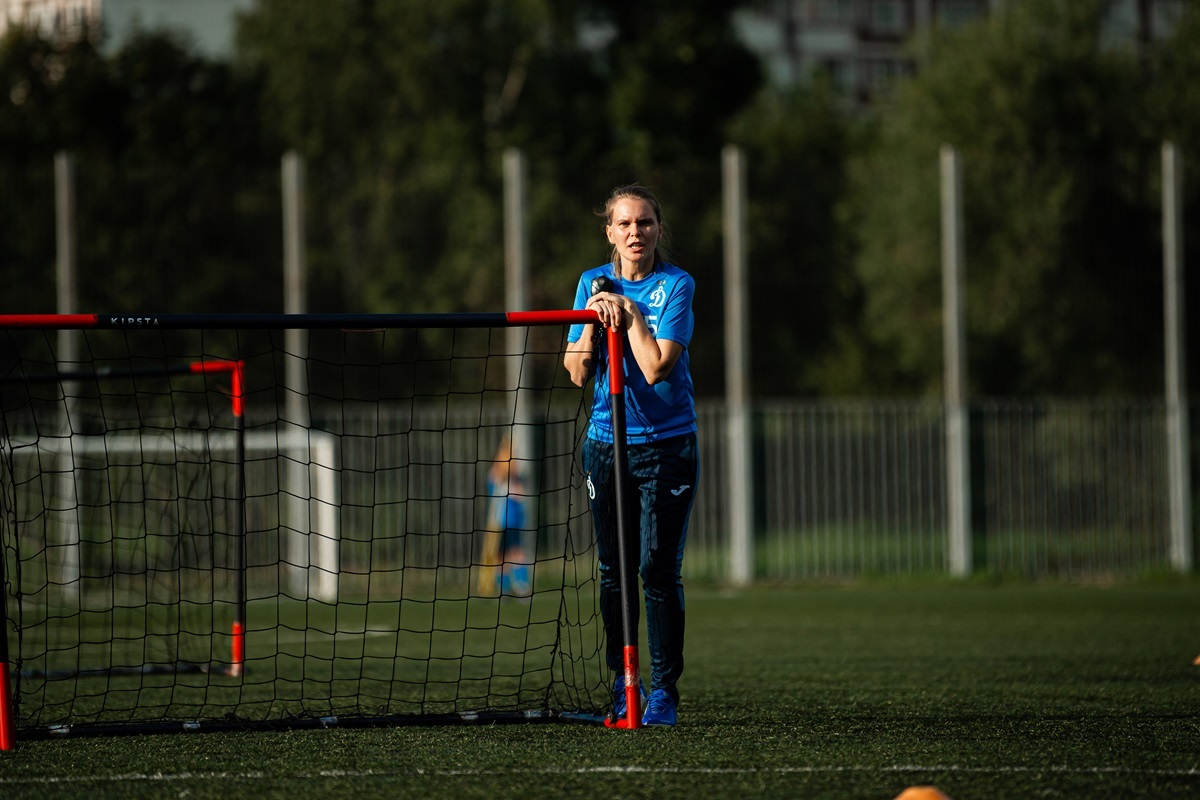
"There is a goal to read all the popular classics"
— Tell us about yourself as a person. What do you do besides football?
— I live a normal life. Home, work, home.
— Any hobbies?
— I love to read, I love to be at home. I have this thing - to read all the popular classics. This goes back to school. However, as soon as Arthur Hailey and John Grisham burst into my life with their detectives, my goal moves away.
Modern literature is also very interesting, but I still keep in my head that I must read all the classics. At the same time, I probably remain the only person who has not read Harry Potter.
— You still play at an amateur level, right? For which team?
— We have a team of dinosaurs, as we call it. We used to play together somewhere at different levels, and now we participate in 7x7 tournaments, mini-football. That is, we just spend time together once a week.
— What goals do you set for yourself? Where and who do you see yourself in ten years?
— I would really like to work at the highest level with the Super League players and the Russian national team.
